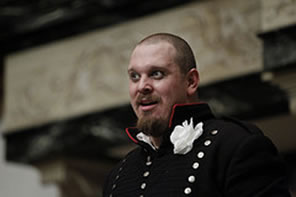A Conversation with King Richard III and Queen Margaret
[Return to previous page]
Do you think that Richard in any way respects Margaret?
BEN: No. [Sarah laughs]. In a word.
Next question.
SARAH: [As if insulted] Right.
BEN: I mean, Ben does.
SARAH: Yeah. Richard does not.
BEN: I think it's an amazing part. An amazing part. But Richard would give her no credit. First of all, she's French. Second of all, she's a woman. Third of all, she killed his little brother and his father, and tortured his father, and kept the crown out of his family that he so strongly believes they deserve. It must be torture for him to be like, “How can they argue that the crown doesn't belong in our family and yet it does belong on the head of a French woman? How is that possible? How is that possible?" So, no; no respect for Margaret, not from Richard.
SARAH: Fair enough. Margaret doesn't have any respect for Richard.
BEN: I was going to say…
SARAH: The feeling is mutual [laughs].
But the lines—I don't remember whose lines they were, they may have been Warwick's—where he's reporting the second St. Albans battle [in Part Three] and there's a respect in that they see Henry as a wuss, but if Margaret is leading, they've got trouble. There does seem to be a sort of fear, a sense that you [to Sarah] are a leader, you get your troops going. Clifford listens to you.
SARAH: Oh yeah. Yeah.
But, of course, they don't respect Clifford at all, either.
BEN: Well, Clifford killed Rutland. The young Clifford did, and my father killed his father. So, you know, if his father had been a better fighter, he'd still be alive. But at least when York kills Lord Clifford, those are two equals in the field, and Clifford dies valiantly in battle. Young Clifford murders a defenseless boy. That's the difference.
It always reminds me of that scene in Batman when the Joker is like, “You made me. You threw me in that tub, you deranged me.” And I feel like Richard and Margaret would both say that about each other.
SARAH: Yeah.
BEN: You made me the animal that I am.
Sarah, was Margaret believing her curses, was she crazy, or was she trying to continue being the she-wolf? What was the purpose of her curses especially as her curses begin to come true?
SARAH: I do not think she's crazy, not in the mentally insane kind of way. I do think, like I said, she's lost everything and that much grief can definitely make a person a bit deranged. But I don't think she's insane in a clinical sense. I don't think she's lost her mind. I think she absolutely believes every single thing that she says. So, I think it's still more of the she-wolf that is there rather than a person who's just crazy and sort of wandering around and spouting crap that she hopes comes true. I think she really does have a bead on what is going on with this guy, with Richard. And I think she does foresee the downfall of everyone. She's lived it, already, and she's watched it happen, and the only joy she has left now is watching all of her enemies go through it. That's the only thing she has left. It is kind of strange that she's hanging around this castle waiting for her prophecies to come true, but she enjoys watching that downfall. She tells everybody about it, she warns them; they do not heed her warnings, and then they suffer.
BEN: And what's that line you have, too, like, Richard even says “Wert thou not banished on pain of death?”
SARAH: “I was, but I do find more pain in banishment than death can yield me here by my abode.”
BEN: Yeah, so it's almost like, “Then [kill me], if you want it so bad. But I'm not leaving.”
SARAH: Yeah.
And you guys don't kill her.
SARAH: No.
You'd just find another finger to break.
BEN: I tried last season, I tried. My brother forbid it.
We talked about how Margaret was so special a character that Shakespeare brought her back. There's no other reason to have her in Richard III.
SARAH: No.
And we felt her appearance in Henry VI, Part Three, is written in such a way that it's like the second-reel entrance, like “when's she coming, she's coming soon, here she comes!” and then she bursts onto the stage, and I can see the audience go “Yeah! There she is.” She's like a cameo in Richard III; she just suddenly shows up.
BEN: Yeah.
SARAH: And a lot of people cut Margaret from Richard III. Ben cut this play that we've done, and I can see how it would be an easy cut, but it changes the whole story. It really does. And it changes the history, takes out a big part of the history, certainly between these two. But she's only in the two scenes, and you can cut what the other characters say about her and you can really streamline Richard III, but I think it's very important that she's there.
Especially if it's following upon the three Henrys.
SARAH: Oh yeah, yeah. I don't think we could get away with cutting her here at all.
[To Curns] Do you think Richard kind of comes into his own in Part Three and that's where Shakespeare decided to go further with him?

Richard, Duke of Gloucester (Benjamin Curns), addresses the audience in Henry VI, Part 3. Photo by Tommy Thompson, American Shakespeare Center.
BEN: Um, well, yeah. Yeah. My opinion on Richard is that once his father and brother are murdered and tortured, there's like a mental snap that happens. And he just says, “What I have been taught is not true. There is no chivalry, there's only brutality; take the gloves off, do whatever you have to do to get what you want, because there are no rules. Your father tried to follow the rules, look where it got him. Margaret isn't going to play by any kind of rules, so just go. Just go.'"
And that extends to my own family as well. I think if Richard thought that Edward or Clarence were worthy of wearing the crown, he might actually support them. But not only is there that huge speech in Henry VI Three where he sort of tells the audience what his designs are, but [the play] is littered with stuff: he's got to convince his father to go to war, he's got to bust his brother out of jail, he's constantly doing all the grunt work for his family to get all this work done. Then in that scene before Margaret comes in [in Richard III], he tells Queen Elizabeth, “Before you were a queen or your husband was king, I was doing all the work. So take a moment to remember how you and every one in your family got to this house. It was built on my sweat and my blood and my father's blood. Don't ever forget how you got here,” and then he follows up by saying, “and don't ever forget who I am and what I'm capable of.”
SARAH: And Margaret says, “a murderous villain, so still thou art.” [Laughter] I haven't forgotten you.
BEN: She does not forget.
[To continue the interview, click here] [For a PDF of this interview, click here]



 Find additional Shakespeareances
Find additional Shakespeareances